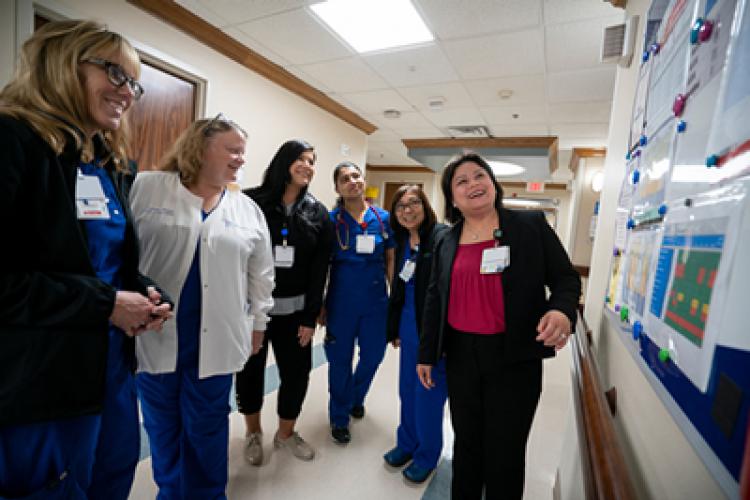
Have you ever looked at a nurse’s ID badge or email signature and noticed a long string of letters behind the name?
LVN, RN, BSN, TCRN -- All those acronyms can help you understand the level of education, skills and qualifications the nurses taking care of you and your family.
Nurses work hard to pursue advanced education, additional training and credentials, spending hours after their shifts attending classes and studying for rigorous exams. Nurses can choose among many specialties and become certified in those areas, showing that they have attained expert knowledge in those fields that they can apply on the job.
Trauma Educator Callie Crawford holds a Bachelors of Science degree in Nursing (BSN), is a Registered Nurse (RN), and is a Trauma Certified Registered Nurse (TCRN).
“Seeking a Bachelor’s of Science in Nursing degree was something I had to dreamed of in order to show my commitment to being the best nurse I could be for all my future patients,” she said. “I obtained the TCRN certification to demonstrate my expertise and knowledge in trauma nursing across the continuum of trauma care. Traumatic situations occur every day and I’m showing patients my continued commitment to providing expert patient care for those injured.”
Christi Nguyen, Executive Director of Medical Surgical Services, had similar sentiment: “I had great mentors who helped develop me in my career. They had challenged me in my growth and development as a leader. Being certified demonstrates my commitment to lifelong learning and focus on excellence in nursing.”
The American Nurses Credentialing Center (ANCC) recommends that nurses present their credentials in a specific order so that it is consistent for nurses around the country, whether they work in a hospital, clinic, school or elsewhere.
The ANCC recommends first listing the highest educational degree earned by the nurse. It is first because it is “permanent” and can’t be taken away due to behavior or not meeting renewal requirements.
Then, nurses should list their licensure and any state designations or requirements, which are required for them to practice.
Following that, nurses should list national certifications, then any awards and honors recognizing outstanding achievements, and then any other recognitions.
Here’s how Nguyen lists her email signature line: Christi Nguyen, DNP, RN, FACHE, NEA-BC, Executive Director of Medical Surgical Services
DNP: Doctor of Nursing Practice
A terminal professional degree in nursing. Nguyen earned it from Texas Christian University. (She also earned her Master of Science in Nursing (MSN), Master of Healthcare Administration (MHA), and Bachelor of Science in Nursing (BSN) degrees from the University of Texas at Arlington.)
RN: Registered Nurse
A license issued by the state after a nurse graduates from a nursing program and passes the national board exam.
FACHE: Fellow of the American College of Healthcare Executives
Credential for board certification in healthcare management and signifies the professional’s expertise, experience and commitment to continuing education and professional development.
NEA-BC: Nurse Executive Advanced-Board Certified
Credential for board certification in which the nurse administrator or executive holds a master’s degree or higher in nursing, or a BSN plus a master’s or doctoral degree in a field related to nursing. The NEA-BC exam tests for advanced knowledge and skills in the practice of nursing and in nursing administration.
Executive Director of Medical Surgical Services
Job title at JPS Health Network. She oversees operations of medical services in the JPS Patient Care Tower at John Peter Smith Hospital.
